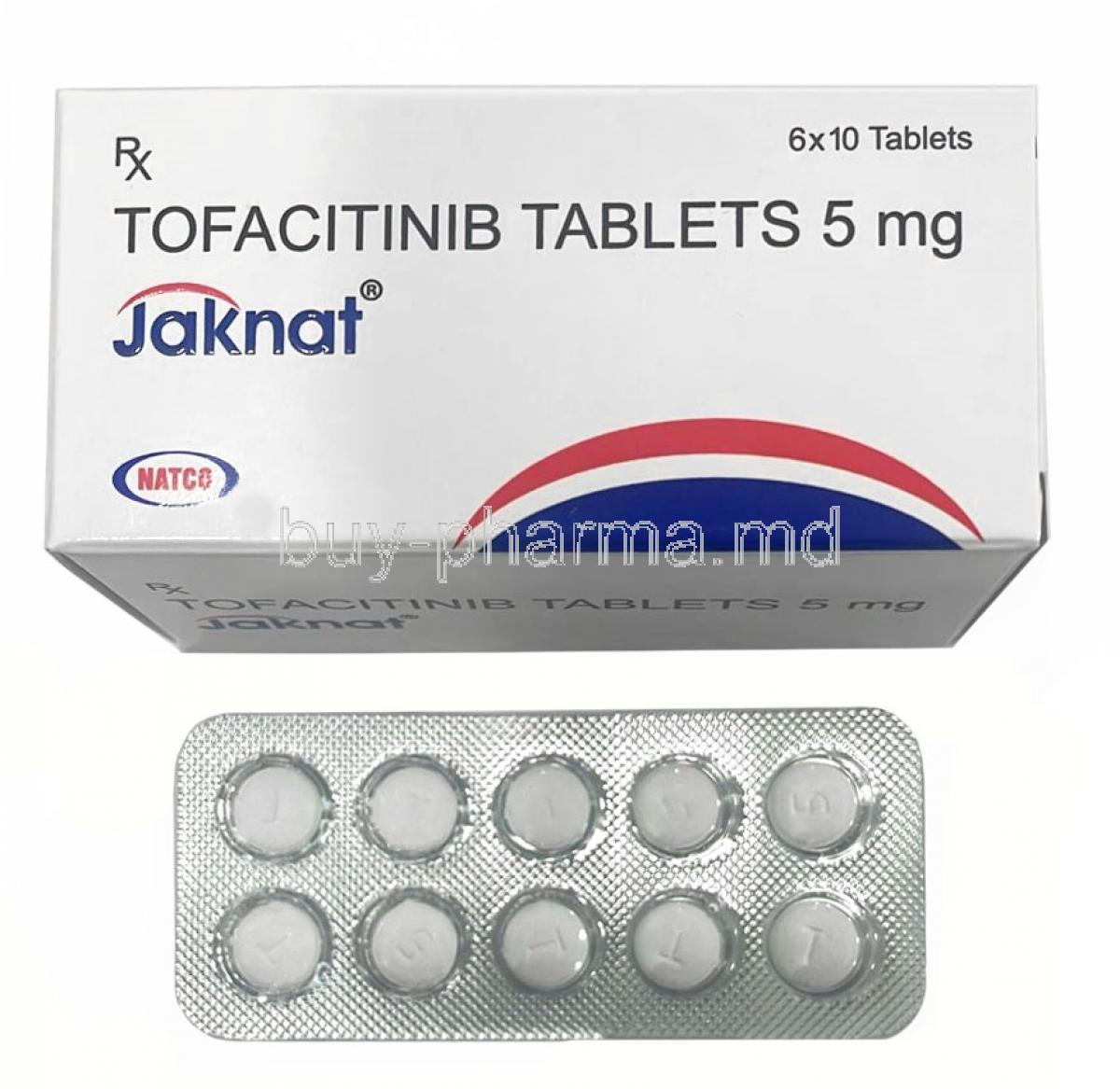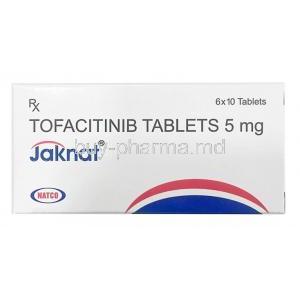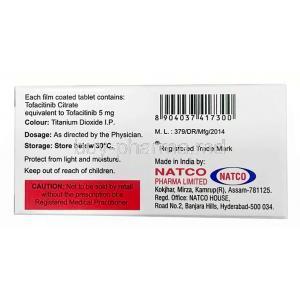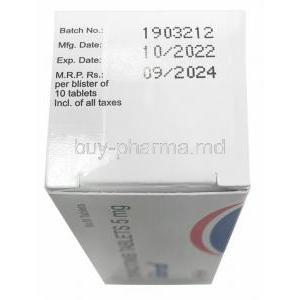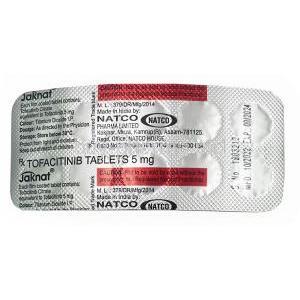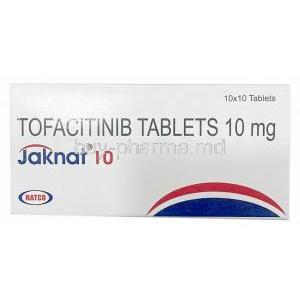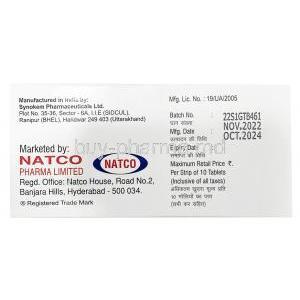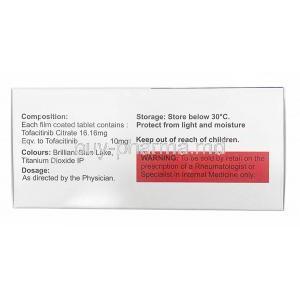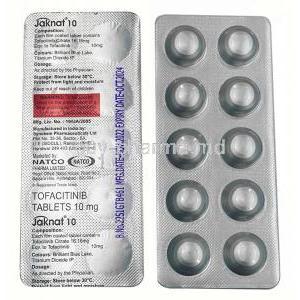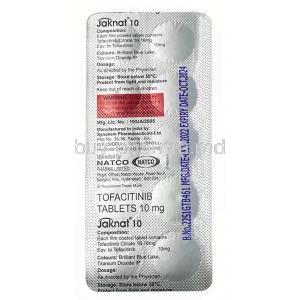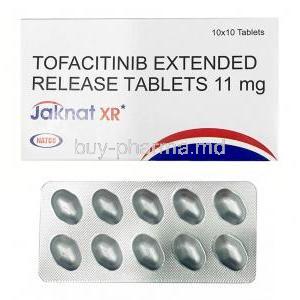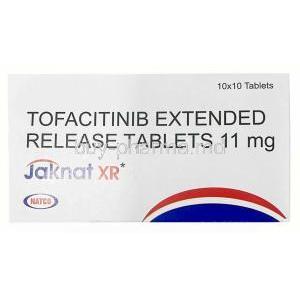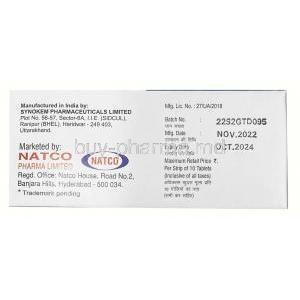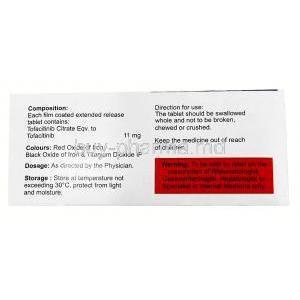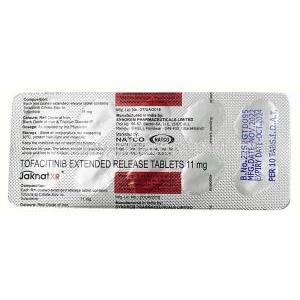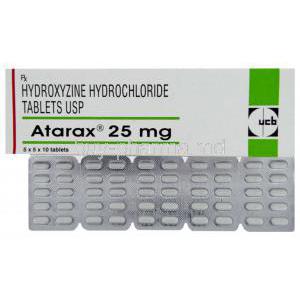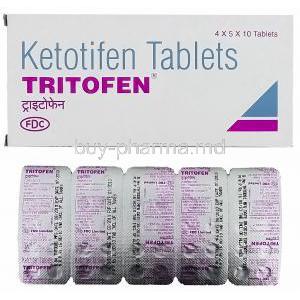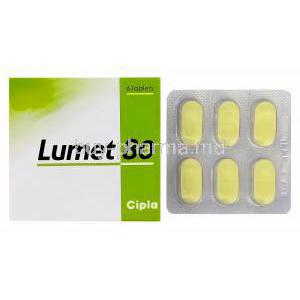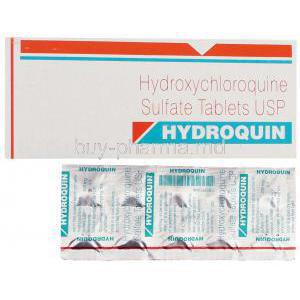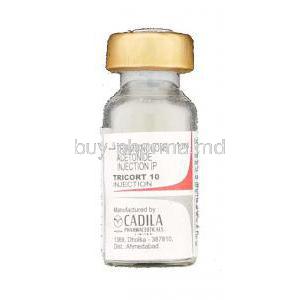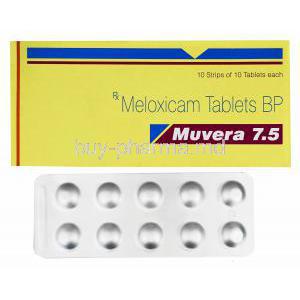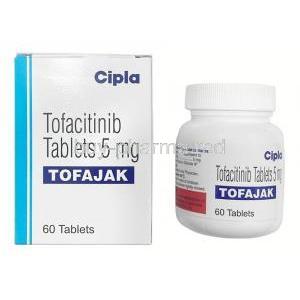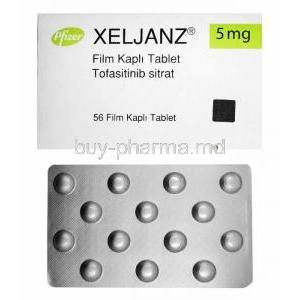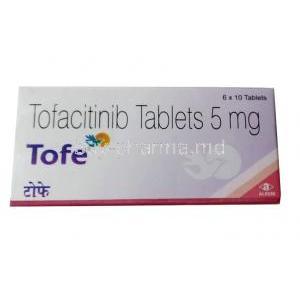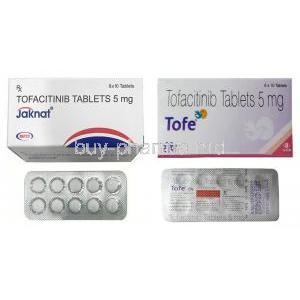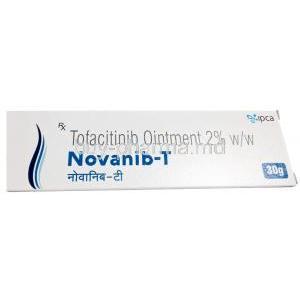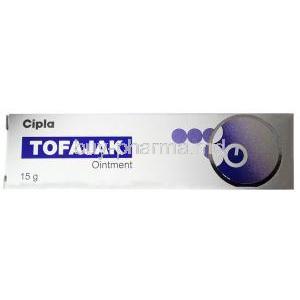Tofacitinib
Uses
How it Works
Common Side effects
Patients who take Jaknat may suffer from such side effects;
Bladder pain,
Bloody or cloudy urine,
Blurred vision,
Body aches or pain,
Chills,
Cough
What is Tofacitinib?
Tofacitinib is a medication used to treat various autoimmune and inflammatory conditions. It is a Janus kinase (JAK) inhibitor, which works by blocking the action of enzymes called JAKs, responsible for transmitting signals that promote inflammation in the body.
Tofacitinib is primarily used to treat rheumatoid arthritis, psoriatic arthritis, and ulcerative colitis in adult patients who have not responded well to other treatments. By inhibiting the JAK enzymes, tofacitinib can help reduce inflammation and alleviate symptoms associated with these conditions.
As with any medication, tofacitinib can have side effects, and it is essential for patients to discuss the benefits and risks with their healthcare provider before starting treatment. Some of the potential side effects include increased risk of infections, changes in blood cell counts, and elevated cholesterol levels.
What is Tofacitinib Used for?
Tofacitinib is used to treat several autoimmune and inflammatory conditions in adults. The primary uses of tofacitinib are:
1 . Rheumatoid arthritis: Tofacitinib is used for the treatment of moderate to severe rheumatoid arthritis in patients who have not responded well to one or more disease-modifying antirheumatic drugs (DMARDs), such as methotrexate. It can be used alone or in combination with other non-biologic DMARDs.
2. Psoriatic arthritis: Tofacitinib is prescribed for the treatment of active psoriatic arthritis in patients who have not responded adequately or are intolerant to other DMARDs. It can be used alone or in combination with non-biologic DMARDs.
3. Ulcerative colitis: Tofacitinib is used to treat moderately to severely active ulcerative colitis in patients who have not responded well to other treatments, such as tumor necrosis factor (TNF) blockers, immunomodulators, or corticosteroids.
Tofacitinib works as a Janus kinase (JAK) inhibitor, blocking the action of enzymes called JAKs that play a crucial role in transmitting signals for inflammation. By inhibiting these enzymes, tofacitinib can help reduce inflammation and alleviate symptoms associated with the conditions mentioned above. It is essential to discuss the benefits and risks of tofacitinib with a healthcare provider before starting treatment, as the medication can have side effects, including an increased risk of infections and changes in blood cell counts.
How to use Tofacitinib?
Tofacitinib is an oral medication, typically available in tablet form. It is essential to follow your healthcare provider's directions and the prescription label instructions when taking tofacitinib. Here are some general guidelines on how to use tofacitinib:
1. Dosage: The dosage of tofacitinib varies based on the specific condition being treated and individual factors such as weight and kidney function. Your healthcare provider will determine the appropriate dosage for you. Generally, the dosage for rheumatoid arthritis and psoriatic arthritis is 5 mg taken twice daily, while for ulcerative colitis, the initial dosage might be higher, followed by a maintenance dosage of 5 or 10 mg twice daily.
2. Timing: Take tofacitinib at approximately the same times every day to maintain a consistent level of medication in your body. This helps ensure the drug's effectiveness.
3. Swallowing: Swallow the tablet whole with a glass of water. Do not crush, break, or chew the tablet.
4. With or without food: Tofacitinib can be taken with or without food. If the medication upsets your stomach, try taking it with a meal or a light snack.
5. Missed dose: If you miss a dose, take it as soon as you remember. If it is almost time for your next dose, skip the missed dose and continue with your regular dosing schedule. Do not take a double dose to make up for a missed one.
6. Duration of treatment: Use tofacitinib as prescribed by your healthcare provider. Do not stop taking the medication without consulting your doctor, even if you feel better. Stopping the medication suddenly may worsen your condition.
It is crucial to attend regular checkups and laboratory tests while taking tofacitinib, as your healthcare provider will monitor your progress and ensure the medication is working effectively and safely. Always discuss any concerns or questions about tofacitinib with your healthcare provider.
What are the side effects of Tofacitinib?
Tofacitinib, like any medication, can cause side effects. While some people may experience mild side effects, others may experience more severe ones. It is essential to discuss the potential benefits and risks of tofacitinib with your healthcare provider before starting treatment. Here are some of the possible side effects of tofacitinib:
Common side effects:
1. Upper respiratory tract infections (e.g., common cold, sinus infections)
2. Headache
3. Diarrhea
4. Nasopharyngitis (inflammation of the nose and throat)
5. Nausea
Serious side effects:
1. Increased risk of infections: Tofacitinib can weaken the immune system, making it easier for you to get infections, such as tuberculosis, fungal infections, and viral infections like herpes zoster (shingles). Notify your healthcare provider if you develop symptoms like fever, chills, cough, or painful skin rash.
2. Changes in blood cell counts: Tofacitinib can cause changes in the number of white blood cells, red blood cells, and platelets in your body. This may increase your risk of infections, anemia, and bleeding. Regular blood tests will be conducted to monitor your blood cell counts.
3. Elevated liver enzymes: Tofacitinib may cause an increase in liver enzymes, indicating liver damage. Your healthcare provider will monitor your liver function through blood tests.
4. Increased cholesterol levels: Tofacitinib can raise cholesterol levels, increasing the risk of heart disease. Your healthcare provider will monitor your cholesterol levels and may adjust your treatment plan if necessary.
5. Gastrointestinal perforation: Though rare, tofacitinib may increase the risk of holes or tears in the stomach or intestines. Notify your healthcare provider if you experience severe stomach pain, vomiting, or fever.
This is not an exhaustive list of side effects. Some people may experience other side effects not listed here. If you experience any unusual or severe side effects while taking tofacitinib, contact your healthcare provider immediately.
Remember that your healthcare provider has prescribed tofacitinib because they believe its benefits outweigh the potential risks. However, it is crucial to stay informed about the possible side effects and report any concerns to your healthcare provider.
How effective is Tofacitinib?
Tofacitinib has been shown to be effective in treating certain autoimmune and inflammatory conditions, including rheumatoid arthritis, psoriatic arthritis, and ulcerative colitis. However, its effectiveness may vary among individuals and depends on several factors, such as the severity of the condition, the patient's medical history, and their response to previous treatments.
1. Rheumatoid arthritis: Clinical trials have demonstrated that tofacitinib, alone or in combination with non-biologic disease-modifying antirheumatic drugs (DMARDs), can significantly reduce symptoms and improve physical function in patients with moderate to severe rheumatoid arthritis who did not respond well to other DMARDs.
2. Psoriatic arthritis: In clinical trials, tofacitinib has been shown to improve the signs and symptoms of psoriatic arthritis, including joint pain, swelling, and skin manifestations, in patients who did not respond adequately to other DMARDs.
3. Ulcerative colitis: Tofacitinib has been found to induce and maintain remission in patients with moderate to severe ulcerative colitis who did not respond well to other treatments, such as corticosteroids, immunomodulators, or tumor necrosis factor (TNF) blockers.
It is essential to note that the effectiveness of tofacitinib can be influenced by factors such as adherence to the treatment plan, drug interactions, and overall health. Regular monitoring by a healthcare provider is crucial to ensure the medication is working effectively and safely. If tofacitinib does not adequately control the symptoms or causes significant side effects, the healthcare provider may adjust the treatment plan or consider alternative therapies.

